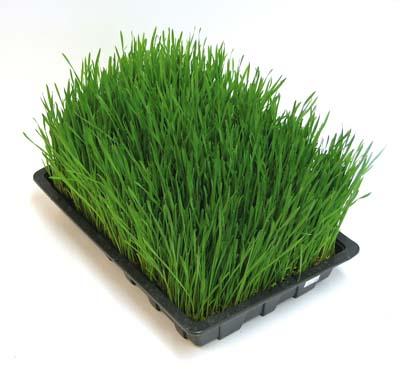Wheatgrass and Cancer
 Dr.
Ann Wigmore, a Boston-based physician, began using
wheatgrass juice for her own wellness in the 1950s. Out of
her experiences, she created the "Living Foods Lifestyle,"
which incorporates organic, raw foods, including wheat
grass, into a program for overall health. Among her many
claims about wheat grass juice was that it could fight
tumors without the toxicity of drugs. Wigmore suggested
drinking small glasses of fresh wheat grass juice
throughout the day. Dr.
Ann Wigmore, a Boston-based physician, began using
wheatgrass juice for her own wellness in the 1950s. Out of
her experiences, she created the "Living Foods Lifestyle,"
which incorporates organic, raw foods, including wheat
grass, into a program for overall health. Among her many
claims about wheat grass juice was that it could fight
tumors without the toxicity of drugs. Wigmore suggested
drinking small glasses of fresh wheat grass juice
throughout the day.
One of the primary benefits of wheatgrass is as a potent
source of chlorophyll, the phytonutrient that gives plants
their green pigment. Douglas Margel, D.C., author of "The
Nutrient-Dense Eating Plan," calls chlorophyll "the blood
of plants" because of its similar molecular structure to
hemoglobin, the protein in human red blood cells that
carries oxygen throughout the body. Chlorophyll is also an
antioxidant, which can help the immune system fight cell
damage from free radicals that can lead to cancerous
tumors.
Because of the iron content, wheatgrass juice may help
counter one of the side effects of chemotherapy drugs. A
2007 study published in the journal "Nutrition and Cancer"
found that 60 cc of wheatgrass juice administered to
breast cancer patients during the first three rounds of
chemotherapy helped reduce hematological toxicity, thus
preventing anemia without decreasing the effectiveness of
the anti-cancer drugs. Wheat grass focuses on "de-toxifying"
the blood and body, while extracting the cancer causing
toxins and heavy metals hidden throughout. Toxins and
heavy metals are mostly stored in the mammary glands
(breasts) of women specifically.
The Wheatgrass Cancer Diet
Most nutritionists recommend a diet of RAW, whole,
nutrient-dense foods for people undergoing cancer
treatment or seeking protection from cancer recurrence,
and wheat grass juice may be a healthy addition to this
type of diet. Health-food stores often sell small flats of
wheat grass you can grow at home to use for juicing or
have juice bars where you can purchase the juice freshly
made. However, wheat grass juice may cause nausea,
according to the Memorial Sloan-Kettering Cancer Center,
worsening a common side effect of treatment. In addition,
fresh wheat grass may harbor microbes that can cause an
infection in people with compromised immune systems, such
as cancer patients. Talk to your doctor about the use of
wheat grass juice in conjunction with cancer treatment.
Wheatgrass and Blood Counts
Cancer patients undergoing chemotherapy may experience
something called myelotoxicity, which is an abnormal level
of blood cells that make up the immune system, resulting
in significantly compromised immunity. Wheatgrass juice
may be able to ameliorate low levels of white blood cells,
helping to reduce myelotoxicity. A 2007 study published in
"Nutrition and Cancer" found that patients undergoing
chemotherapy for breast cancer had lower myelotoxicity and
reduced need for medications to stimulate white blood cell
production. The juice also did not interfere with the
chemotherapy. Some patients had an increase in nausea that
forced them to stop using wheatgrass juice. More research
needs to be done on the effects of wheatgrass juice and
chemotherapy, but if you are receiving chemotherapy, ask
your treatment team if wheatgrass juice is safe for you to
consume.
Wheatgrass and Nutrients
When you have cancer and are undergoing treatment, your
body needs nutrients like vitamins and minerals, and your
diet helps provide these substances. Wheatgrass juice
contains multiple vitamins and minerals, including
vitamins A, C, E, K and B-complex; iron; calcium;
magnesium; selenium and amino acids, according to Memorial
Sloan-Kettering Cancer Center. Some of the vitamins listed
are antioxidants, which help protect cells from damage
caused by free radicals and may help reduce the risk of
disease. Wheatgrass juice should not be used as a primary
source of nutrients but can be a healthful addition to
your diet if your doctor approves it.
|